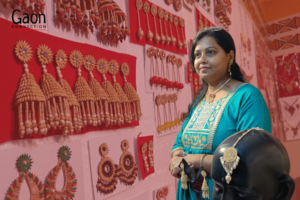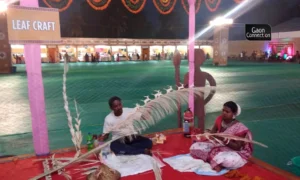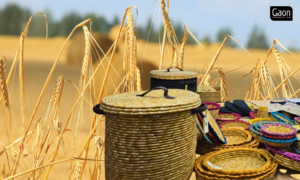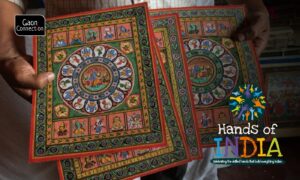Fatehpur, Barabanki (Uttar Pradesh)
Madhu Verma, a 30-year-old resident of Barabanki’s Fatehpur town in Uttar Pradesh is rejoicing at being able to earn money and contribute to her household income.
“Earlier, I used to stay at home and depend on my husband’s earnings to manage household expenses but ever since I joined a self help group which makes rakhis. I earn anything between Rs 300 to Rs 400 in a day and it feels really good to have my own money and use it to afford household expenses,” Verma told Gaon Connection.
In Barabanki’s Fatehpur block, as many as 9,000 women in Fatehpur block are working in clusters of self help groups (SHGs) under the National Rural Livelihood Mission (NRLM). These women are provided the raw materials by the district administration to make products which are in high demand during festivals. Accordingly, they make earthen lamps during Diwali, dry colours [gulaal] during Holi and rakhis during Rakshabandhan.
“Fatehpur block has 900 such self help groups which began their operations in 2020. The rakhi making activities have been going on for two months and these rakhis have a huge demand in the local as well as on e-commerce platforms. These rakhis are also available on Amazon,” Dhananjay Singh, block mission manager of the NRLM in Fatehpur told Gaon Connection.

These women are provided the raw materials by the district administration to make products which are in high demand during festivals.
Neha Verma, the secretary of Jai Hanuman Self Help Group informed that her group began with four women workers but has now grown to include 15 women.
“These women have made 50,000 rakhis so far and we are expecting handsome profits in the ongoing Rakshabandhan festive season,” Verma told Gaon Connection.
‘Morale booster, empowering’
Meanwhile, Sunita Devi, a mother of three children told Gaon Connection that being a part of the SHG provides her a sense of belonging and the profit earned makes her feel confident about herself.
“My husband was the sole breadwinner of my household but now I also contribute to the earnings. A single rakhi uses raw materials worth Rs 20 and it gets sold at Rs 50. I feel much more independent and confident about myself ever since I have begun earning money,” she said.
Ramvati, another worker from the group stated that the onset of the festive season was ridden with anxieties for her as festivals meant a sharp spike in expenses.
“But now, we eagerly wait for these festivals as we have enough money to celebrate them wholeheartedly. Also, the festive season brings in business opportunities for us. We also make incense sticks and perfumed diyas during Diwali,” she said happily.

















